中考英语常用短语的区别与运用(2)
中考英语常用易混淆单词词组的区别用法详解
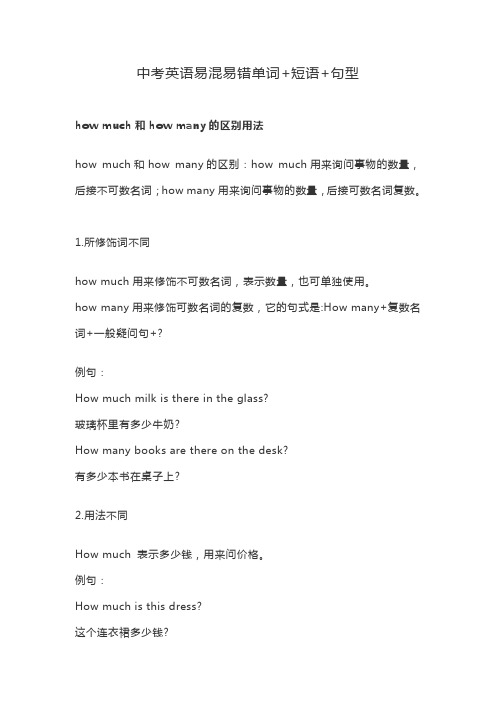
中考英语易混易错单词+短语+句型how much和how many的区别用法how much和how many的区别:how much用来询问事物的数量,后接不可数名词;how many用来询问事物的数量,后接可数名词复数。
1.所修饰词不同how much用来修饰不可数名词,表示数量,也可单独使用。
how many用来修饰可数名词的复数,它的句式是:How many+复数名词+一般疑问句+?例句:How much milk is there in the glass?玻璃杯里有多少牛奶?How many books are there on the desk?有多少本书在桌子上?2.用法不同How much 表示多少钱,用来问价格。
例句:How much is this dress?这个连衣裙多少钱?How many 表示多少,用来问数量。
例句:How many apples do you have?你有多少苹果?in和on的区别用法当我们表示某些东西被其他东西所包围时使用“in”这个词。
而“on”用于描述物体被放置在其他物体上方或外部的情况。
in可表时间,表地点,表手段、方法、材料。
on表示时间、地点、方位等。
1.意思不同in:prep.在... 里;在... 地方;在... 期间on:prep.在... 之上2.用法不同in:in着重一段时间的过程,常用于重复动作或延续动作。
in表示从现在时间算起推移到将来的一段时间之后,一般与将来时态连用。
例句:He is a layman in economics.他对经济学一窍不通。
on:表示“在物体的表面上”,只能用on的表达方式有on the next morning,on the following。
例句:The spider is walking on the ceiling.蜘蛛在天花板上爬行。
3.侧重点不同in:表示“在其中”。
on:表示“在表面”。
中考英语78个易混易错单词+短语+句型(全)
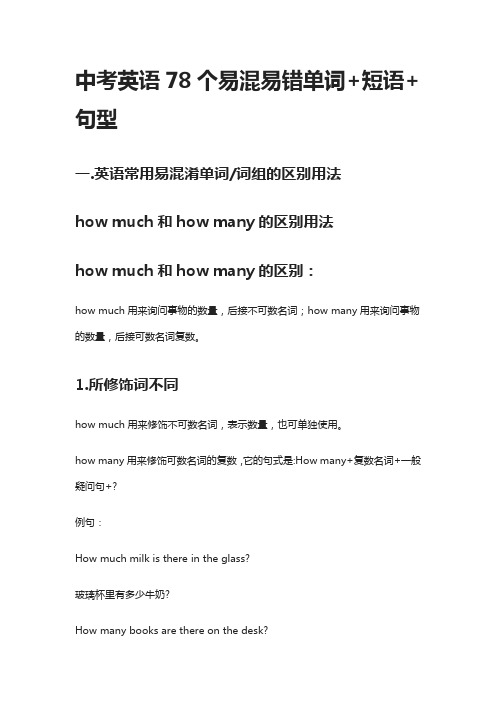
中考英语78个易混易错单词+短语+句型一.英语常用易混淆单词/词组的区别用法how much和how many的区别用法how much和how many的区别:how much用来询问事物的数量,后接不可数名词;how many用来询问事物的数量,后接可数名词复数。
1.所修饰词不同how much用来修饰不可数名词,表示数量,也可单独使用。
how many用来修饰可数名词的复数,它的句式是:How many+复数名词+一般疑问句+?例句:How much milk is there in the glass?玻璃杯里有多少牛奶?How many books are there on the desk?有多少本书在桌子上?2.用法不同How much 表示多少钱,用来问价格。
例句:How much is this dress?这个连衣裙多少钱?How many 表示多少,用来问数量。
例句:How many apples do you have?你有多少苹果?in和on的区别用法:当我们表示某些东西被其他东西所包围时使用“in”这个词。
而“on”用于描述物体被放置在其他物体上方或外部的情况。
in可表时间,表地点,表手段、方法、材料。
on表示时间、地点、方位等。
1.意思不同in:prep.在 ... 里;在 ... 地方;在 ... 期间on:prep.在 ... 之上2.用法不同in:in着重一段时间的过程,常用于重复动作或延续动作。
in表示从现在时间算起推移到将来的一段时间之后,一般与将来时态连用。
He is a layman in economics.他对经济学一窍不通。
on:表示“在物体的表面上”,只能用on的表达方式有on the next morning,on the following。
The spider is walking on the ceiling.蜘蛛在天花板上爬行。
3.侧重点不同in:表示“在其中”。
初中英语中的常见短语用法总结
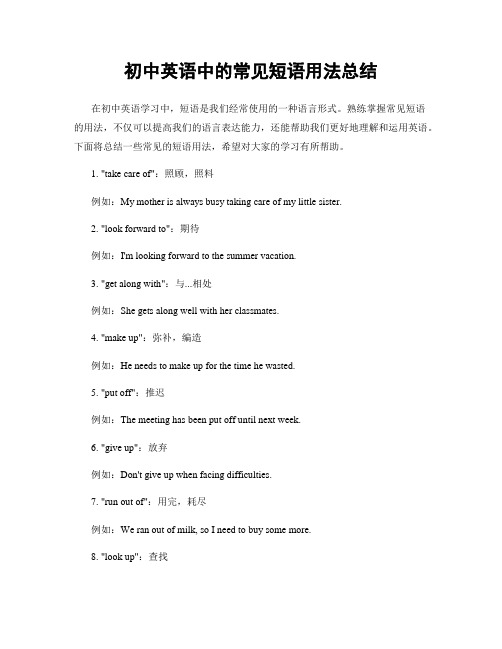
初中英语中的常见短语用法总结在初中英语学习中,短语是我们经常使用的一种语言形式。
熟练掌握常见短语的用法,不仅可以提高我们的语言表达能力,还能帮助我们更好地理解和运用英语。
下面将总结一些常见的短语用法,希望对大家的学习有所帮助。
1. "take care of":照顾,照料例如:My mother is always busy taking care of my little sister.2. "look forward to":期待例如:I'm looking forward to the summer vacation.3. "get along with":与...相处例如:She gets along well with her classmates.4. "make up":弥补,编造例如:He needs to make up for the time he wasted.5. "put off":推迟例如:The meeting has been put off until next week.6. "give up":放弃例如:Don't give up when facing difficulties.7. "run out of":用完,耗尽例如:We ran out of milk, so I need to buy some more.8. "look up":查找例如:If you don't know the meaning of a word, you can look it up in the dictionary.9. "take off":起飞,脱下例如:The plane took off on time.10. "turn on/off":打开/关闭例如:Please remember to turn off the lights when you leave the room.11. "pick up":拾起,接人例如:I picked up the book from the floor.12. "set up":建立,设立例如:We set up a new club at our school.13. "get on/off":上车/下车例如:Please wait until the bus stops before getting on or off.14. "look after":照顾,照料例如:My grandparents look after me when my parents are away.15. "give in":屈服,让步例如:Don't give in to peer pressure.16. "turn up/down":调高/调低例如:Can you turn up the volume? I can't hear the music.17. "take out":取出,带出去例如:I took out some money from my wallet.18. "look out":当心,小心例如:Look out! There's a car coming.19. "get over":克服,恢复例如:It took her a long time to get over the loss of her pet.20. "put on":穿上,涂抹例如:She put on her coat and went out.以上是初中英语中常见短语的用法总结。
中考英语短语用法归纳总结

中考英语短语用法归纳总结1 (see 、hear 、notice 、find 、feel 、listen to 、look at (感官动词)+ doeg :I like watching monkeys jump2 (比较级and 比较级)表示越来越怎么样3 a piece of cake =easy 小菜一碟(容易)补:a place of interest 名胜4 agree with sb 赞成某人5 all kinds of 各种各样 a kind of 一样6 all over the world = the whole world 整个世界7 along with 同……一道,伴随……eg : I will go along with you 我将和你一起去the students planted trees along with their teachers 学生同老师们一起种树8 As soon as 一怎么样就怎么样9 as you can see 你是知道的10 ask for ……求助向…要…(直接接想要的东西)eg : ask you for my book11 ask sb for sth 向某人什么12 ask sb to do sth 询问某人某事ask sb not to do 叫某人不要做某事13 at the age of 在……岁时eg:I am sixteen I am at the age of sixteen14 at the beginning of …………的起初;……的开始15 at the end of +地点/+时间最后;尽头;末尾eg : At the end of the day16 at this time of year 在每年的这个时候补:at least 至少17 be /feel confident of sth /that clause +从句感觉/对什么有信心,自信eg : I am / feel confident of my spoken English I feel that I can pass the test18 be + doing 表:1 现在进行时2 将来时19 be able to (+ v 原) = can (+ v 原)能够……eg : She is able to sing She can sing 补:base on 以…(为)根据20 be able to do sth 能够干什么eg :she is able to sing21 be afraid to do (of sth 恐惧,害怕……eg : I'm afraed to go out at night I'm afraid of dog22 be allowed to do 被允许做什么eg: I'm allowed to watch TV 我被允许看电视I should be allowed to watch TV 我应该被允许看电视23 be angry with sb 生某人的气eg : Don't be angry with me24 be angry with(at) sb for doing sth 为什么而生某人的气25 be as…原级…as 和什么一样eg : She is as tall as me 她和我一样高26 be ashamed to27 be away from 远离28 be away from 从……离开29 be bad for 对什么有害eg : Reading books in the sun is bad for your eyes 在太阳下看书对你的眼睛不好30 be born 出生于31 be busy doing sth 忙于做什么事be busy with sth 忙于……32 be careful 当心;小心be close to…离…很近33 be different from……和什么不一样34 be famous for 以……著名35 be friendly to sb 对某人友好36 be from = come from 来自eg :He is from Bejing He comes from Bejing Is he from Bejing ? Does he come from Bejing ?37 be full of 装满……的be filled with 充满eg: the glass is full of water the glass is filled with water38 be glad+to+do/从句39 be going to + v(原)将来时40 be good at(+doing) = do well in 在某方面善长, 善于……41 be good for 对什么有好处eg : Reading aloud is good for your English42 be happy to do 很高兴做某事43 be helpful to sb 对某人有好处eg : Reading aloud is helpful to you 大声朗读对你有好处Exercising is helpful to your bady 锻炼对你的身体有好处44 be in good health 身体健康45 be in trouble 处于困难中eg : She is in trouble They are in tronble46 be interested in 对某方面感兴趣47 be late for = come late to 迟到eg: Be late for class 上课迟到48 be like 像……eg : I'm like my mother49 be mad at 生某人的气50 be made from 由……制成(制成以后看不见原材料) 补:be made in 在…生产或制造51 be made of 由……制成(制成以后还看得见原材料)52 be not sure 表不确定53 be on a visit to 参观54 be popular with sb 受某人欢迎补:be please with 对…感到满意55 be quiet 安静56 be short for 表**的缩写eg: 陶is short for 陶俊杰57 be sick in bed 生病在床58 be sorry to do sth be sorry for sbeg : I am sorry for you59 be sorry to hear that60 be sorry to trouble sb eg : I am sorry to trouble you61 be strict in doing sth 严于做某事eg : He's strict in obeying noles62 be strict with sb 对某人要求严格eg: Some students are not strict with them selves 这些学生对自己不严格63 be strict with sb in sth 某方面对某人严格64 be supposed to do 被要求干什么65 be sure 表确定66 be sure of doing sth 对做某事有信心eg: He is sure of winning I am sure of learning English well67 be sure of sth 对做某事有信心eg: I'm sure of my head (my teacher 我相信我的大脑(老师)68 be sure that sth 对做某事有信心eg: I'm suer that he can pass the test 我相信他能通过考试69 be sure to do sth 一定会做某事eg: We are sure to pass the test 我们一定会通过这次考试We are sure to learn English well 我们一定能学好英语70 be terrified of + 名/动doing 害怕……71 be terrified to do sth 害怕做某事72 be the same as …和什么一样73 be used to doing sth 习惯做某事eg: My father is used to getting up early 我爸爸习惯早起He is used to sleeping in class 他习惯上课睡觉He is used to working hard He is used to hard work 他习惯努力工作74 be worth doing 值得做什么75 be(feel) afraid to do sth 害怕做某事be afraid of sth 害怕某物be afraid that 丛句76 because+句子because of +短语eg : He was late because he had a headache He was late because of his headache77 begin to do = start to do 开始做某事start…with…=begin…with…以什么开始什么eg : Let's begin the game with the songI begin to go home78 between…and…两者之间79 borrow sth from sb 向……借……lend sth to sb ( lend sb sth 借给……什么东西eg : I borrowed a pen from him he lent a pen to me ( he lent me a pen80 both = the same(as) = not different(from) 表相同81 bother 打扰bother sb to do sth补:bo th…and… …和…都eg : I'm sorry to bother you ,but can you tell me to way to the station我十分道歉打扰你,但是你能告诉我怎么去车站the problem has been bothering me for weeks 这个问题困扰了我几个周了He's bothering me to lend him money82 by the end of 到……为止83 call sb sth eg : We call him old wang84 care 关心eg : Don't you care about this country's future ?你为什么不关心国家的未来85 catch up with sb 赶上某人86 chat with sb 和某人闲谈take sb to + 地点带某人去某地87 come in 进来88 come over to 过来89 come up with 提出eg: Can you come up with a good idea 你能想出一个好办法吗?90 communicate with sb 和某人交流91 consider + doing 考虑做什么eg : Why not consider going to lu zhou 为什么不考虑去泸州?92 dance to 随着……跳舞eg : She likes dancing to the music 她喜欢随着音乐跳舞93 decide to do sth 决定做某事94 do a survey of 做某方面的调查95 do better in 在……方面做得更好补:do well in 在……方面干的好96 do wrong 做错补:droup off 放下(某物)97 Don't forget to do sth 不要忘了做某事98 Don't mind +doing /从句/名词不要介意……99 each +名(单)每一个……eg : Each student has many books 每一个学生都有一些书100 end up +doing101 enjoy +doing 喜欢102 escape from 从……逃跑eg: The prisoners have escaped from the prison 犯人从监狱里逃跑出来Some gas is escaping from the pipe 有一些气体从管子里冒出103 expect to do sth 期待做某事104 fall down 摔下来fall off 从哪摔下来105 fall in love with sb /sth 爱上什么106 far from 离某地远eg : The school is far from my home107 find +it +adj +to do 发现做某事怎么样108 find sb/sth +adj 发现什么怎么样?eg : I find the book interesting109 finish 完成+doing(名词)110 fit to sb = be fit for sb 适合某人111 forget to do 没有做而忘了forget doing 做了而又忘了eg: Don't forget to go home I forget closing door112 from…to…从某某到某某eg: From me for her113 get /have sth down 做完,被(别人)做……eg: I have my hair cut 我理了发(头发被剪了)Tom got his bad tooth pulled out 汤母把他的坏牙拔掉了(被牙医拔掉了)114 get a part-time job = find a part-time job 115 get along well with sb = get on well with sb 与某人相处得好116 get along with sb = get on with sb 与某人相处117 get ready for = be ready for 为什么而准备eg : I get ready for math I am ready for math 补:get…bake 退还…118 get sb in to trouble 给某人麻烦119 get sb to do sth get out of 从…取出120 get…from…从某处得到某物121 give a talk 做报告eg: He is give a tall 122 give sth to sb give sb sth 给某人某物123 go fish 钓鱼go swimming 游泳补:go over 过一遍;仔细检查124 go on to do 去做下一件事go on doing 继续做这件事125 go out away from go out of126 go to school 上学(用于专业的)go to the school 去学校(不一定是上学)127 good way to 好方法128 hate to do 讨厌没做过的事hate doing 讨厌做过的事129 have a party for sb 举办谁的晚会130 have a talk 听报告谈一谈131 have been doing 现在完成进行时eg : You have been talking You have been sleeping since132 have been to …( 地方)……去过某过地方have gone to …(地方)去了某地还没回来had better(not) do sth 最好(不要)做某事133 have fun +doing 玩得高兴134 have sth to do 有什么事要做eg: I have a lot of homework to do 我有很多家庭作业要做I have nothing to do 我没什么事情做135 have to do sth 必须做某事have sth done 请某人做某事136 have trouble (problem) (in) doing sth 做什么事情有麻烦137 have…time +doing have no time to do sth没有时间做某事138 have…(时间)…off 放……假eg: I have month off 我请一个月得假139 hear sb +do/doing 听见某人做某事/正在做某事140 help a lot 很大用处141 help sb with sth \one's sth 帮助某人某事(某方面)help sb (to) do sth 帮助某人做某事142 hope to do sth 希望做某事143 How about(+doing) = What about(+doing) 144 how do you like = what do you think of 你对什么的看法145 if : 是否=whethereg: I don't know if (whether) I should go to the party 我不知道我是否应该去参加晚会He don't know if (whether) we will arrive on time tomorrow morning 他不知道我们明天早上是否能准时到达146 if :如果,假如(全部接一般时态)+条件语态从句eg: I'll go to LuZhou if it does't rain 假如明天不下雨,我就去泸州If they change the plan they will let me know 假如他们要改变计划,他们会让我知道的I'll go to England ,if I have enough money next year 如果我明年由足够的钱,我就要去英国147 in one's opinion = sb think 某人认为148 in some ways 在某些方面149 in the end = finally(adv) 最后150 in the north of…什么在什么的北方(north 北sowth 南west 西east 东)151 in the sun 在太阳下152 increase 增加eg : They've increased the prece of petrol by 3% 他们把石油价增加了3%the population has increased from 12 million ten years ago to 18 million now153 instead of +(名)代替eg: I'd like an apple instead of a pear 我想要苹果,而不要梨子I like English instead of math 我喜欢英语而不喜欢数学154 introduce sb to sb 介绍某人给某人introduce oneself 自我介绍155 invite sb to do sth 邀请某人做某事156 It takes sb sometime to do sth 做某人花掉某人多少时间eg : It took me 5 minutes to do my homework It takes me half an hour to cook157 It's +adj +for sb to do sth 对某人来说做某事怎么样158 It's +adj +to do 做某事怎么样159 It's +adj for sb 对于某人来说怎么样It's +adj of sb 对某人来说太怎么样160 It's +adj(for sb) to do(对某人来说)做某事怎么样It's +adj of sb to do sth 对某人来说做某事太怎么样eg : It's nice of you to help me with my English161 It's a good idea for sb to do sth 对……来说是个好主意162 It's important to sb 对某人来说很重要eg: It's important to me163 It's time to do sth It's time for sth 到了该去做某事的时间eg : It's time to have class It's time for class 该去上课了164 join = take part in 参加165 just now 刚才166 keep +sb /sth +adj /介词短语让什么保持什么样?167 keep out 不让……进入168 keep sb adj 让……保持……eg: I want to keep my mother happy keep healthy 保持健康169 key to +名词表示:某物的钥匙或某题的答案170 key to…anser to …key 可以是答题或钥匙171 laugh at…取笑……eg : Don't langh at others We langhed at the joke 172 learn by oneslfe 自学learn from 从…学习173 learn from sb 向某人学习eg: We should learn from Lei Feng174 learn to do sth 学做某事learn something by heart 背诵记熟175 let sb do sth 让某人做某事lend something to somebody把某物借给某人176 Let sb down 让某人失望eg :We shouldn't let our farents down 我们不应该让我们的父母失望177 live from :离某地远178 live in +大地方/at +小地方居住在某地eg: I live in LuZhou She lives at XuanTan179 look after = take care of 照顾照看180 lose one's way 谁迷路eg : Lose your way 你迷路181 make a decision to do sth 决定做某事补:make a contribution to doing 贡献给182 make friends with sb 和谁成为朋友eg : I want to make friends with you183 make it early 把时间定的早一点184 make on exhibition of oneself 让某人出洋相185 make sb /n +n 使什么成为什么eg : I made her my step moller I made you my wife186 make sb /sth +adj 使某人(某物)怎么样eg : You must made your bed clean187 make sb /sth adj 使某人/某物怎么样188 make sb do sth 让某人做某事eg : I made him write 我以前让他写189 make up one's mind190 make…difference to…191 mind sb to do mind one's doing 介意……做什么192 most +名most of +代193 much too +形容词194 must be 一定195 need +名词196 need sb do sth 需要某人做某事197 need to do (实义动词)need do (情态动词)198 no /neithr of hate to do no /neithr of hate doing199 no +名词200 not anymore = no more 再也不……eg: He didn't cry any more He cried nomore 他再也不哭201 not…(形、副)at all eg: He's not tall at all she doesn't junp far at all202 not…at all 一点都不not only…but also…不但…而且…203 not…either 表否定,也不eg : I don't japanse either I don't have sister, either 我也没有姐姐204 not…until 直到……才……eg: I didn't sleep until my mother came back The child didn't stop crying until I give her sugar205 offer / provide sb with sth 给某人提供206 offer sb sth ( offer sth to sb 提供什么东西给某人eg : I offer you water (I offer water to you 我给你提供水207 on one's way to…在谁去那的路上208 on the one hand 一方面on the other hand 另一方面209 on the phone = over the phone 用交谈210 on time 准时in time 及时211 one day =some day =someday 一天,有一天212 one of +可数名词的复数形式213 one to another 一个到另一个214 over and over agin 一遍又一遍的eg : He cleaned the floor over and over agin215 part-time job 兼职工作fall-time job 全职工作216 pay for…付……钱pay the bill 开钱,付钱217 please +do pull…up from…把…从…拉上来218 please help yourself219 pleased with sb220 pool into = pore into221 practice +doing 练习做某事222 prefer sth to sth 相对……更喜欢……eg : I prefer physics to chemisty 在物理和化学中,我更喜欢物理prefer doing to sth 更喜欢去做…不愿意去做…eg: He prefers riding a bike to diving 他更喜欢骑自行车,不开小车prefer to do sth rather than do sth 宁愿做…也不愿eg: My unde prefers to buy a now car rather than repaiv the used one 我叔叔更喜欢买新的车,也不去修旧车prefer sb not to do sth 更愿意…eg: I prefer her not to come 我不喜欢她不来223 pretend to do sth 装着去做什么pretend that 从句eg : The two cheats pretended to be working very hard 这两个骗子装着努力工作He pretended that he did not know the answer 他装着不知道答案224 rather…than 宁可……也不……eg : I would rather be a doctor than a teacher 我愿肯当医生,也不当老师He likes dogs rather than cats 他喜欢狗,不喜欢猫225 regard…as 把……当作……eg: Please give my best regards to your family 请带我向你的家人我最好的问候I regard you as my friend 我把你当作我的朋友He shows little regard for others 他不爱关心别人226 remid sb about sth 提醒某人什么事remid sb to do sth 提醒某人做某事eg : he remids me about cooking (he remids me to cook 他提醒我做饭227 remid sb of sth 使某人想起什么eg : the pictures remind me of my school days 这照片使我想起了我的学校the words that (which) the teacher talke to remind me of my mother228 return sth to sb 还什么东西给某人229 say to oneself 对自己说230 say to sb 对某人说231 sb spend somemoney on sth 花了多少钱在某事上232 sb spend sometime with sb 花了多少时间陪谁233 sb spend sometime(in) doing sth 花了多少时间做某事234 sb with sb +is sb and sb +are235 see sb do 看见某人做过某事see sb doing 看见某人正在做某事236 seem to do/be +adj 显得怎么样eg : You seem to be tired You seem to be happy it seem that237 send +sb sth 送给某人某物238 send…to…把什么寄到哪里去?239 shock 使……震惊eg : Oh , It's only you ! You give me a shock 啊,是你呀!吓我一跳240 show sb sth 向某人展示某物eg : I show her the book.241 show sb sth = show sth to sb 拿什么东西给某人看eg: Show me your pen Show your pen to me242 show sth to sb 向某人展示某物eg : I show the book to her.243 some…others…一些……另一些……244 start…with…从……开始begin…with…从……开始245 stay away from 远离……start doing sth/start to dosth 开始做某事eg : We're told to stay away from the animals whe visiting the zoo 当我们参观zoo 时,我们要远离动物If you want to lose weight you'd better stay auay from the sweet food 徒工你想减肥,你最好远离甜食246 stop doing 停下正在做的事247 stop sb from doing sth 阻止某人做某事248 stop sb(from) doing 阻止某人做某事249 stop to do 停下正在做的事去做下一件事250 such +名这样,这种251 suit sb 适合某人252 surprise sb 使某人惊奇to one's surprise 令某人惊奇253 take classes 上课take one's temperature 给某人量体温254 take sb to 把某人带去eg : I take you to the hospital255 take walks = take a walk =go for a walk 散步256 ①talk to 对谁说eg : I talk to you②talk with 和谁说eg : I talk with him③talk of 谈到eg : we talked of you④talk about 谈论关于……257 talk with sb 和某人说话258 teach sb sth 教某人做某事259 tell sb do sth 告诉某人做某事260 tell sb sth tell sb that 丛句tell sb not to do sth tell a story261 tell sb sth 告诉某人某事262 tell sb to do sth 告诉某人做什么tell sb not to do sth 告诉某人不要做什么263 t ell…from… thank to幸亏,由于264 thank you for +doing thank sb for sth 因某事而感谢某人265 the same +名词(doing)+as……the more…the more…越…就越…266 the same…(名)…as as…(adj adv)…as 相同267 the way to do sth=the way of doing sth 做某方面的方法the day before yesterday 前天the way to +地方去哪的路e g : Do you know the way to learn EnglishDo you know the way of learning English268 the way to…(地点)到哪的路269 too…to…太怎样而不能……adj +enough to 足够…能…so…that +丛句太…所以…(such+名词…that+从句)eg: He is too young to go to school = He is so young that he can't go to schoolHe is old enough to go to school =He is so old that he can go to school270 transalte ……into……把什么翻译成什么eg : Trasalte English into chinese271 travel with sb 和某人去旅游272 try one's best to do sth 尽某人最大的努力去做某事eg: I will try my best to learn English well273 try to do sth 想干什么,但没成功try doing sth 想干什么,已经做过了eg :He tried to climb 他想爬上去,但没成功He tried climbing 他想爬上去,已经做过了274 try…试衣服have a try 试一下275 turn down 开小←→turn up 开大276 turn off 关上←→turn on 打开open 拆开277 upside down 倒着nuless=if not278 visit to…参观某个地方279 wait for sb 等某人280 wait for sb to do sth 等某人做什么wait for sb 等某人wait for sometime 等多少间eg : Would you please wait for me to get ready 等我准备好,好吗?Let's wait for the rain to stop 让我们等雨停吧281 wake sb up 把某人叫醒282 want to do sth 想做某事283 watch sb do sth 观看某人做某事补:wear out把…穿坏284 welcome to +…(地方)欢迎到……285 what about +n /doing eg : what about an apple286 what if 如果……怎么办What if +句子eg : What if it is true ? 如果是真的怎么办?What if aliens should come to the earth 假如外星人来到地球怎么办?287 what they will do = what to do288 What's the matter ? = What's the trouble ? = What's wrong ? 有什么困难?289 while +延续性动词290 why don't you do = why not do291 will you please do will you please not do292 with one's best = with the help of sb 在某人的帮助下293 with the help of sb 在某人的帮助下with one's help294 work at…在某处工作295 work with sb 和某人一起工作296 would like sth /to do sth eg : I would like to go to LuZhou297 would you please +do 298 yet :至今,用在否定句中299 you'd better do 最好做某事= you'd better not do 最好不要做某事300 不定式+v(原)301 联系动词(taste吃起来/sound听起来/look 看起来/semll闻起来)+adj302 名词、副词、形容词修饰enongh 时, 形容词放在之前,名词副词放在之后303 太多too much +不可数too many +可数much too 相当于very ,修饰形容词304 向宾语提问:Whom 305 向地点提问:Where 306 向方式提问:How307 向价格和不可数名词提问:How much 308 向可数名词提问:How many309 向频率提问:How often 310 向时间段提问:How long311 向时间提问:what time/when 312 向物主代词提问:Whose313 向职业提问:what do/does……do 314 向主语提问:Who315 在将来时中,……以后(用in,一般时态中,……以后(用after感官动词see, watch, observe, notice, look at, hear, listen to, smell, taste, feel + do表示动作的完整性,真实性;+doing 表示动作的连续性,进行性I saw him work in the garden yesterday.昨天我看见他在花园里干活了。
中考英语完形填空常用短语

中考英语完形填空常用短语(1)1.With the help of 在~~帮助下under the leadership / care of 在~~领导/关心下2.be strict with sb. 对~人要求严格be strict in sth. 对~事要求严格3. at present=at the present time 目前for the present 暂时4. in the sun/sunshine 在阳光下under the sun 在世界上5. lie in 位于~~之内lie on 同~~接壤lie to 位于~~之外6. at least 至少in the least 丝毫,一点7. by name 名叫in the name of 以~~名义8. in the air 空中,在流传on the air 播出9. in the way 挡路,障碍,用~~方法in a way 在某点上,在某种程度上get one’s own way to do 随心所欲give way 让步,屈服lose one’s way 迷路by the way 顺便说一下on one’s way to 在去~~的路上Come this way 这边走10. at the corner 在拐角处(外角)in the corner 在角落里(内角)on the corner 在角落上(外角上)11. judge by / from 根据~~来判断judge for oneself 由某人自己来判断12. at the end (of)在~~结束时at the beginning of 在~~开始时at the back of 在~~背后,支持at the age of ~~岁时 atthe foot of 在~~脚下at the bottom of 在~~底部at the top of 在~~顶上 at/on the edge of在~~边上13. in the course of 在~~过程中in the eyes of 从~~观点看来,在~~眼里in the face of面对~,尽管,纵使in the middle of 在~中间 in the end =at last=finally 最后14. on the eve of 在~~前夕on the side of 在~~一边15. after a time = after some time 过一段时间后for a time = for some time 一时,有一段时间16. behind time 迟到,过期behind the times 落在时代后面17. at no time 决不in no time 立即,马上18. at one time = once time 曾经at a time = each time 每次 at times = sometimes 有时 at all times 经常,一直,始终at the same time 同时at the time 在~~的时候 by the time 到~~的时候19. for a moment 一会儿for the moment 暂时at the moment 当时the moment /minute /instance 正当~~一刹那20. once or twice 一两次more than once 不止一次once more 重新,又once upon a time 从前once in a while 偶尔中考英语完形填空常用短语(2)1.以break为中心的词组break away from 脱离,逃离break down 破坏,粉碎;瓦解;出故障,抛锚break in闯进,打断;使顺服break into闯入;强行进入;突然开始breakout爆发,发生;准备使用;起锚break the law 违反法律break the record 破记录break one's promise 失言break up 开垦,破碎;解散,分开,分解2.以catch为中心的词组be caught doing 被发现做某事 be caught in the rain 淋雨catch a bus/train赶汽车/火车 catch a cold 伤风,感冒catch one's word 听懂某人的话 catch sight of发现,瞥见catch 赶上,追及,追上3.以come为中心的词组come along 一道来,陪伴;进步,进展;出现come at 达到,求得,得到;扑向,袭击come back 回来;恢复,复原 come down 倒下;降落;跌落;病倒come from 来自,起源于,从~~产生,生于come in 进来,进入;流行起来;获名次come into being 发生,产生,出现,形成come into power开始执政,当权,当选come into use开始使用,获得应用come on上演;开始;赶快;发展;登台;(问题)被提出come to know 开始了解到come to 苏醒,复原;共计;达到;归结于come true实现,成为现实;证实中考英语完形填空常用短语(3)4.以do为中心的词组be done in 精疲力竭be done with 完全结束do a good deed 做一件好事do away with 去掉,废除;弄死;浪费do good to(=do sb. good) 有益于do harm to 有害于do its work 有效,有作用do much 极有用do wrong to做错do one’s best尽某人最大努力 do one's homework做作业do proud 足以使~~骄傲do sb.justice公平对待某人do some cleaning (V+ing,etc。
中考英语必背词语辨析、词组和句型(2)
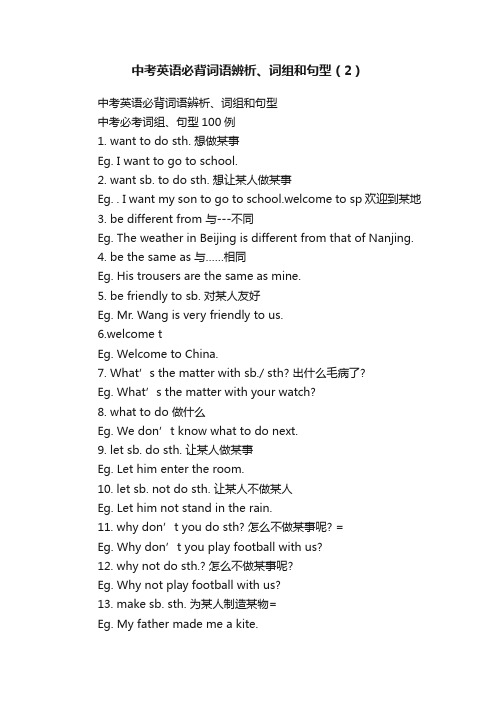
中考英语必背词语辨析、词组和句型(2)中考英语必背词语辨析、词组和句型中考必考词组、句型100例1. want to do sth. 想做某事Eg. I want to go to school.2. want sb. to do sth. 想让某人做某事Eg. . I want my son to go to school.welcome to sp欢迎到某地3. be different from 与---不同Eg. The weather in Beijing is different from that of Nanjing.4. be the same as 与……相同Eg. His trousers are the same as mine.5. be friendly to sb. 对某人友好Eg. Mr. Wang is very friendly to us.6.welcome tEg. Welcome to China.7. What’s the matter with sb./ sth? 出什么毛病了?Eg. What’s the matter with your watch?8. what to do 做什么Eg. We don’t know what to do next.9. let sb. do sth. 让某人做某事Eg. Let him enter the room.10. let sb. not do sth. 让某人不做某人Eg. Let him not stand in the rain.11. why don’t you do sth? 怎么不做某事呢? =Eg. Why don’t you play football with us?12. why not do sth.? 怎么不做某事呢?Eg. Why not play football with us?13. make sb. sth. 为某人制造某物=Eg. My father made me a kite.14. make sth for sb. 为某人制造某物Eg. My father made a kite for me.15. What …mean by …?做……是什么意思?Eg. What do you mean by doing that?16. like doing sth. 喜爱做某事Eg. Jim likes swimming.17. like to do sth.喜爱做某事Eg. He doesn’t like to swim now.18. feel like doing sth. 想做某事Eg. I feel like eating bananas.19. would like to do sth. 愿意做某事Eg. Would you like to go rowing with me?20. would like sb. to do sth. 愿意某人做某事Eg. I’d like you to stay with me tonight.21. make sb. do sth. 逼使某人做某事Eg. His brother often makes him stay in the sun.22. let sb. do sth.让某人做某事Eg. Let me sing a song for you.23. have sb. do sth. 使某人做某事Eg. You shouldn’t have the students work so hard.24. be far from sp离某地远Eg. His school is far from his home.25. be near to sp离某地近Eg. The hospital is near to the post office.26. be good at sth./doing sth.擅长某事/做某事Eg. We are good at English.They are good at boating.27. It takes sb. some time to do sth.某人花多少时间做某事Eg. It took me more than a year to learn to draw a beautiful horse in five minutes.28. sb. spends some time/money (in )doing sth.某人花多少时间做某事Eg. I spent twenty years in writing the novel.29. sb. spends some time/money on sth.某事花了某人多少时间/金钱Eg. Jim spent 1000 yuan on the bike.30. sth. costs sb. some money.某物花了某人多少钱Eg. The bike cost Jim 1000 yuan.31. sb. pays some money for sth.某人为某物付了多少钱Eg. Jim paid 1000 yuan for the bike.32. begin/start with sth. 开始做某事Eg. The started the meeting with a song.33. be going to do sth. 打算做某事Eg. We are going to study in Japan.34. call A B叫A BEg. They called the village Gumtree.35. thank sb. for sth./doing sth.感谢某人做某事Eg. Thank you for your help.Thank you for helping me.36. What ……for? 为什么Eg. What do you learn English for?37. How/ what about doing sth.?做某事怎么样?Eg. How about going fishing?38. S +be+ the+最高级+of/in短语=Eg. Lucy is the tallest in her class.39. S + be +比较级+than any other + n.Eg. Lucy is taller than any other student in her class.40. have to do sth.不得不做某事Eg. I have to go home now.41. had better do sth. 最好做某事Eg. You’d better study hard at English.42. had better not do sth. 最好别做某事Eg. You’d better not stay up.43. help sb. to do sth. 帮助某人做某事Eg. Lucy often helps Lily to wash her clothes.44. help sb. do sth.帮助某人做某事Eg. He usually helps me learn English.45. help sb. with sth. 帮助某人做某事Eg. I sometimes help my mother with the housework.46. make it +时间把时间定在几点Eg. Let’s make it 8:30.47. take sb. to sp带某人到某地Eg. Mr. Wang will take us to the Summer Palace next Sunday.49. have nothing to do (with sb)与某人没有关系Eg. That has nothing to do with me.50. 主语+ don’t think + 从句认为……不……Eg. I don’t think it will rain tomorrow.。
专为中考考生准备的初中英语常用短语、词语辨析
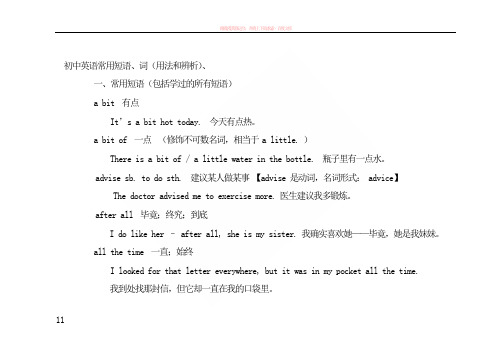
初中英语常用短语、词(用法和辨析)、一、常用短语(包括学过的所有短语)a bit 有点It’s a bit hot today. 今天有点热。
a bit of 一点(修饰不可数名词,相当于a little. )There is a bit of / a little water in the bottle. 瓶子里有一点水。
advise sb. to do sth. 建议某人做某事【advise 是动词,名词形式:advice】The doctor advised me to exercise more. 医生建议我多锻炼。
after all 毕竟;终究;到底I do like her – after all, she is my sister. 我确实喜欢她——毕竟,她是我妹妹。
all the time 一直;始终I looked for that letter everywhere, but it was in my pocket all the time.我到处找那封信,但它却一直在我的口袋里。
11and so on 等等Asas soon as 一……就……【由该短语引导的时间状语从句,需用一般现在时态表示将来时】I’ll call you as soon as I get there. 我一到那里就给你打电话。
as well (在口语中用得很多,用法和too 一样,两者可以互换,通常位于句末)I can do it as well. 我也能做这件事。
as well as 除……之外;并;和;也He gave me money as well as advice. 他除了给我中告外,还给了我钱。
ask for 请求;要①ask for +某人意思是:找某人,要求见某人Someone is asking for you at the door. 门口有人找你。
②ask for +某物意思是:要某物He wants to ask for some water. 他想要些水。
中考英语常用词组及用法解析
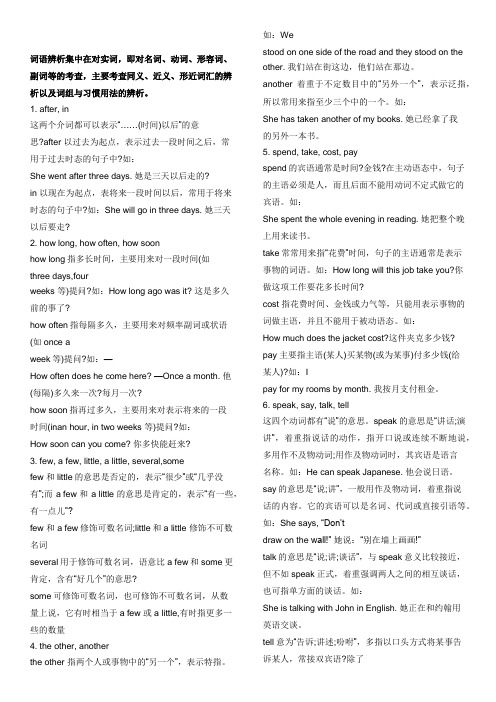
词语辨析集中在对实词,即对名词、动词、形容词、副词等的考查,主要考查同义、近义、形近词汇的辨析以及词组与习惯用法的辨析。
1. after, in这两个介词都可以表示“……(时间)以后”的意思?after 以过去为起点,表示过去一段时间之后,常用于过去时态的句子中?如:She went after three days. 她是三天以后走的?in 以现在为起点,表将来一段时间以后,常用于将来时态的句子中?如:She will go in three days. 她三天以后要走?2. how long, how often, how soonhow long指多长时间,主要用来对一段时间(如three days,fourweeks 等)提问?如:How long ago was it? 这是多久前的事了?how often指每隔多久,主要用来对频率副词或状语(如once aweek等)提问?如:—How often does he come here? —Once a month. 他(每隔)多久来一次?每月一次?how soon指再过多久,主要用来对表示将来的一段时间(inan hour, in two weeks 等)提问?如:How soon can you come? 你多快能赶来?3. few, a few, little, a little, several,somefew 和little的意思是否定的,表示“很少”或“几乎没有”;而a few和a little的意思是肯定的,表示“有一些,有一点儿”?few 和 a few修饰可数名词;little和 a little 修饰不可数名词several用于修饰可数名词,语意比a few和some更肯定,含有“好几个”的意思?some可修饰可数名词,也可修饰不可数名词,从数量上说,它有时相当于a few 或 a little,有时指更多一些的数量4. the other, anotherthe other 指两个人或事物中的“另一个”,表示特指。
中考英语重点易混淆短语总结精华(推荐)
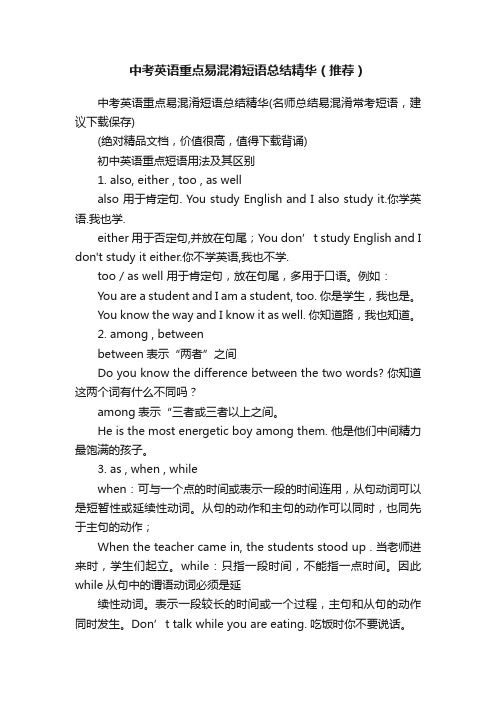
中考英语重点易混淆短语总结精华(推荐)中考英语重点易混淆短语总结精华(名师总结易混淆常考短语,建议下载保存)(绝对精品文档,价值很高,值得下载背诵)初中英语重点短语用法及其区别1. also, either , too , as wellalso 用于肯定句. You study English and I also study it.你学英语.我也学.either 用于否定句,并放在句尾;You don’t study English and I don't study it either.你不学英语,我也不学.too / as well 用于肯定句,放在句尾,多用于口语。
例如:You are a student and I am a student, too. 你是学生,我也是。
You know the way and I know it as well. 你知道路,我也知道。
2. among , betweenbetween表示“两者”之间Do you know the difference between the two words? 你知道这两个词有什么不同吗?among表示“三者或三者以上之间。
He is the most energetic boy among them. 他是他们中间精力最饱满的孩子。
3. as , when , whilewhen:可与一个点的时间或表示一段的时间连用,从句动词可以是短暂性或延续性动词。
从句的动作和主句的动作可以同时,也同先于主句的动作;When the teacher came in, the students stood up . 当老师进来时,学生们起立。
while:只指一段时间,不能指一点时间。
因此while从句中的谓语动词必须是延续性动词。
表示一段较长的时间或一个过程,主句和从句的动作同时发生。
Don’t talk while you are eating. 吃饭时你不要说话。
中考英语常见短语辨析
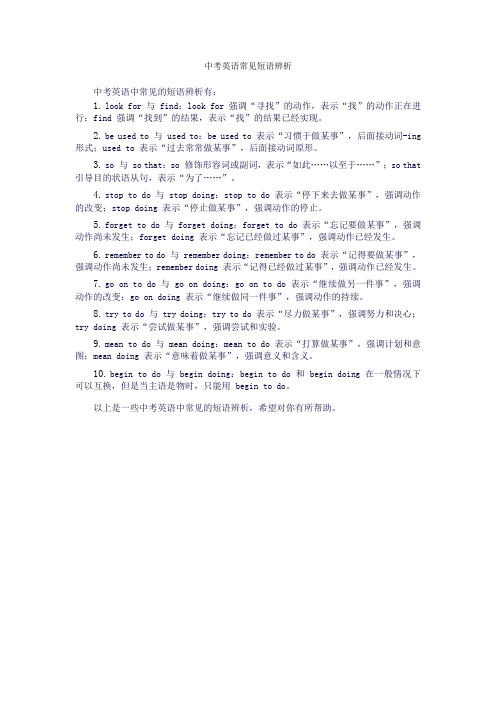
中考英语常见短语辨析中考英语中常见的短语辨析有:1.look for 与 find:look for 强调“寻找”的动作,表示“找”的动作正在进行;find 强调“找到”的结果,表示“找”的结果已经实现。
2.be used to 与 used to:be used to 表示“习惯于做某事”,后面接动词-ing 形式;used to 表示“过去常常做某事”,后面接动词原形。
3.so 与 so that:so 修饰形容词或副词,表示“如此……以至于……”;so that 引导目的状语从句,表示“为了……”。
4.stop to do 与 stop doing:stop to do 表示“停下来去做某事”,强调动作的改变;stop doing 表示“停止做某事”,强调动作的停止。
5.forget to do 与 forget doing:forget to do 表示“忘记要做某事”,强调动作尚未发生;forget doing 表示“忘记已经做过某事”,强调动作已经发生。
6.remember to do 与 remember doing:remember to do 表示“记得要做某事”,强调动作尚未发生;remember doing 表示“记得已经做过某事”,强调动作已经发生。
7.go on to do 与 go on doing:go on to do 表示“继续做另一件事”,强调动作的改变;go on doing 表示“继续做同一件事”,强调动作的持续。
8.try to do 与 try doing:try to do 表示“尽力做某事”,强调努力和决心;try doing 表示“尝试做某事”,强调尝试和实验。
9.mean to do 与 mean doing:mean to do 表示“打算做某事”,强调计划和意图;mean doing 表示“意味着做某事”,强调意义和含义。
10.begin to do 与 begin doing:begin to do 和 begin doing 在一般情况下可以互换,但是当主语是物时,只能用 begin to do。
中考重点常见词汇和短语的用法
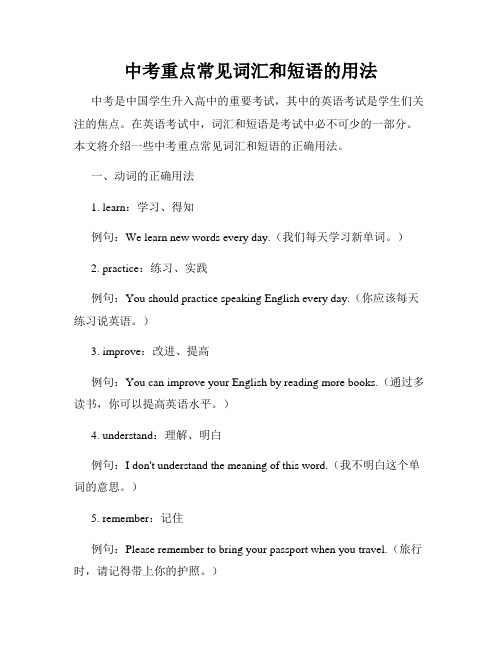
中考重点常见词汇和短语的用法中考是中国学生升入高中的重要考试,其中的英语考试是学生们关注的焦点。
在英语考试中,词汇和短语是考试中必不可少的一部分。
本文将介绍一些中考重点常见词汇和短语的正确用法。
一、动词的正确用法1. learn:学习、得知例句:We learn new words every day.(我们每天学习新单词。
)2. practice:练习、实践例句:You should practice speaking English every day.(你应该每天练习说英语。
)3. improve:改进、提高例句:You can improve your English by reading more books.(通过多读书,你可以提高英语水平。
)4. understand:理解、明白例句:I don't understand the meaning of this word.(我不明白这个单词的意思。
)5. remember:记住例句:Please remember to bring your passport when you travel.(旅行时,请记得带上你的护照。
)二、名词的正确用法1. exam:考试例句:I have an English exam tomorrow.(我明天有一场英语考试。
)2. grade:年级、分数例句:He is in the fifth grade.(他在五年级。
)3. subject:科目例句:Math is my favorite subject.(数学是我最喜欢的科目。
)4. book:书例句:I borrowed a book from the library.(我从图书馆借了本书。
)5. knowledge:知识例句:Reading can broaden our knowledge.(阅读可以扩大我们的知识面。
)三、形容词和副词的正确用法1. difficult:困难的例句:This math problem is difficult to solve.(这个数学问题很难解。
中考英语重点单词和短语用法总结

中考英语重点单词和短语用法总结1.单词:- appreciate: 表示感谢或欣赏,后接名词/动名词。
例如:I appreciate your help. (我感谢你的帮助。
)- revise: 表示复习,后接名词/动名词。
例如:I need to revise for the test. (我需要为考试复习。
)- predict: 表示预测,常与will连用。
例如:I predict that it will rain tomorrow. (我预计明天会下雨。
)2.短语:- put off: 表示推迟。
例如:I had to put off the meeting because of a scheduling conflict. (由于时间冲突,我不得不推迟会议。
- look forward to: 表示期待。
例如:I'm looking forward to the summer vacation. (我期待着暑假。
)- take part in: 表示参加。
例如:I'm going to take part in the school talent show. (我打算参加学校的才艺表演。
)- get along with: 表示与...相处。
例如:She gets along well with her classmates. (她与她的同学们相处得很好。
)这些单词和短语在中考英语中经常出现,掌握它们的用法对于提高中考英语成绩具有重要的作用。
通过练习和使用这些单词和短语,可以加强对它们的理解和运用能力。
中考英语常用易混淆单词词组的区别用法详解
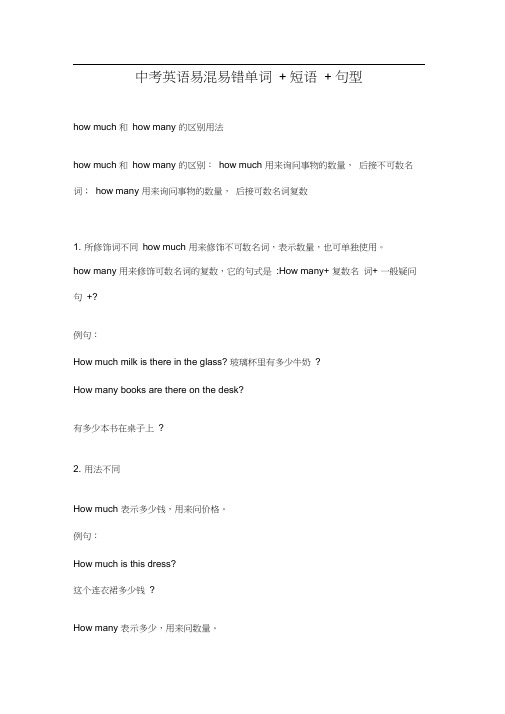
中考英语易混易错单词+ 短语+ 句型how much 和how many 的区别用法how much 和how many 的区别:how much 用来询问事物的数量,后接不可数名词;how many 用来询问事物的数量,后接可数名词复数1. 所修饰词不同how much 用来修饰不可数名词,表示数量,也可单独使用。
how many 用来修饰可数名词的复数,它的句式是:How many+ 复数名词+ 一般疑问句+?例句:How much milk is there in the glass? 玻璃杯里有多少牛奶?How many books are there on the desk?有多少本书在桌子上?2. 用法不同How much 表示多少钱,用来问价格。
例句:How much is this dress?这个连衣裙多少钱?How many 表示多少,用来问数量。
例句:How many apples do you have?你有多少苹果?in 和on 的区别用法当我们表示某些东西被其他东西所包围时使用“ in ”这个词。
而“ on 用于描述物体被放置在其他物体上方或外部的情况。
in 可表时间,表地点,表手段、方法、材料。
on 表示时间、地点、方位等。
1. 意思不同in :prep. 在... 里;在... 地方;在... 期间on :prep. 在... 之上2. 用法不同in :in 着重一段时间的过程,常用于重复动作或延续动作。
in 表示从现在时间算起推移到将来的一段时间之后,一般与将来时态连用。
例句:He is a layman in economics.他对经济学一窍不通on :表示“在物体的表面上”,只能用on 的表达方式有on the next morning ,on the following 。
例句:The spider is walking on the ceiling.蜘蛛在天花板上爬行。
初中英语短语辨析知识点总结
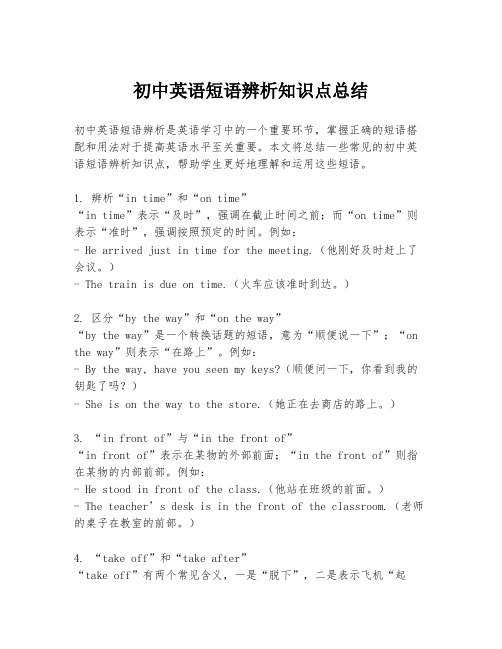
初中英语短语辨析知识点总结初中英语短语辨析是英语学习中的一个重要环节,掌握正确的短语搭配和用法对于提高英语水平至关重要。
本文将总结一些常见的初中英语短语辨析知识点,帮助学生更好地理解和运用这些短语。
1. 辨析“in time”和“on time”“in time”表示“及时”,强调在截止时间之前;而“on time”则表示“准时”,强调按照预定的时间。
例如:- He arrived just in time for the meeting.(他刚好及时赶上了会议。
)- The train is due on time.(火车应该准时到达。
)2. 区分“by the way”和“on the way”“by the way”是一个转换话题的短语,意为“顺便说一下”;“on the way”则表示“在路上”。
例如:- By the way, have you seen my keys?(顺便问一下,你看到我的钥匙了吗?)- She is on the way to the store.(她正在去商店的路上。
)3. “in front of”与“in the front of”“in front of”表示在某物的外部前面;“in the front of”则指在某物的内部前部。
例如:- He stood in front of the class.(他站在班级的前面。
)- The teacher’s desk is in the front of the classroom.(老师的桌子在教室的前部。
)4. “take off”和“take after”“take off”有两个常见含义,一是“脱下”,二是表示飞机“起飞”;“take after”则表示“与……相像”。
例如:- Please take off your shoes before entering.(请在进入前脱掉鞋子。
)- The plane will take off in ten minutes.(飞机将在十分钟后起飞。
中考英语常用短语的区别与运用
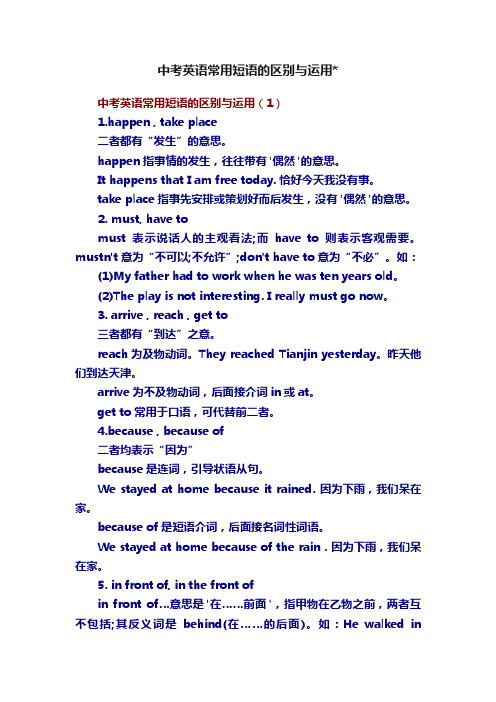
中考英语常用短语的区别与运用*中考英语常用短语的区别与运用(1)1.happen , take place二者都有“发生”的意思。
happen指事情的发生,往往带有"偶然"的意思。
It happens that I am free today. 恰好今天我没有事。
take place指事先安排或策划好而后发生,没有"偶然"的意思。
2. must, have tomust表示说话人的主观看法;而have to则表示客观需要。
mustn't意为“不可以;不允许”;don't have to意为“不必”。
如:(1)My father had to work when he was ten years old。
(2)The play is not interesting. I really must go now。
3. arrive , reach , get to三者都有“到达”之意。
reach为及物动词。
They reached Tianjin yesterday。
昨天他们到达天津。
arrive为不及物动词,后面接介词in或at。
get to常用于口语,可代替前二者。
4.because , because of二者均表示“因为”because是连词,引导状语从句。
We stayed at home because it rained. 因为下雨,我们呆在家。
because of是短语介词,后面接名词性词语。
We stayed at home because of the rain . 因为下雨,我们呆在家。
5. in front of, in the front ofin front of…意思是"在……前面",指甲物在乙物之前,两者互不包括;其反义词是behind(在……的后面)。
如:He walked infount of me。
英语中常见的动词短语和短语动词的区别和用法
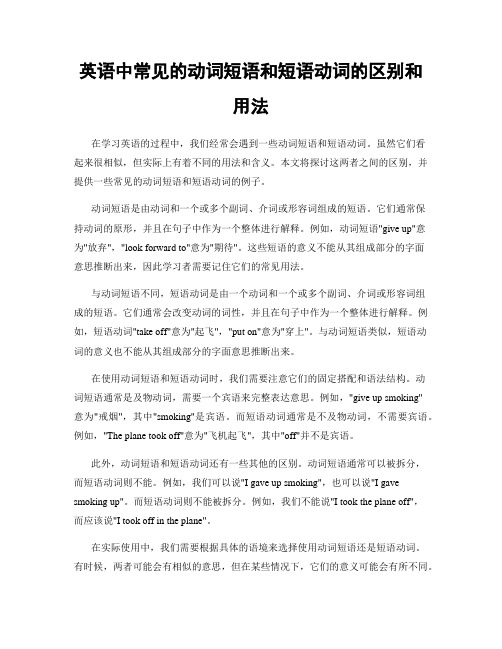
英语中常见的动词短语和短语动词的区别和用法在学习英语的过程中,我们经常会遇到一些动词短语和短语动词。
虽然它们看起来很相似,但实际上有着不同的用法和含义。
本文将探讨这两者之间的区别,并提供一些常见的动词短语和短语动词的例子。
动词短语是由动词和一个或多个副词、介词或形容词组成的短语。
它们通常保持动词的原形,并且在句子中作为一个整体进行解释。
例如,动词短语"give up"意为"放弃","look forward to"意为"期待"。
这些短语的意义不能从其组成部分的字面意思推断出来,因此学习者需要记住它们的常见用法。
与动词短语不同,短语动词是由一个动词和一个或多个副词、介词或形容词组成的短语。
它们通常会改变动词的词性,并且在句子中作为一个整体进行解释。
例如,短语动词"take off"意为"起飞","put on"意为"穿上"。
与动词短语类似,短语动词的意义也不能从其组成部分的字面意思推断出来。
在使用动词短语和短语动词时,我们需要注意它们的固定搭配和语法结构。
动词短语通常是及物动词,需要一个宾语来完整表达意思。
例如,"give up smoking"意为"戒烟",其中"smoking"是宾语。
而短语动词通常是不及物动词,不需要宾语。
例如,"The plane took off"意为"飞机起飞",其中"off"并不是宾语。
此外,动词短语和短语动词还有一些其他的区别。
动词短语通常可以被拆分,而短语动词则不能。
例如,我们可以说"I gave up smoking",也可以说"I gave smoking up"。
中考英语常用短语的区别与运用(二)

中考英语常用短语的区别与运用(二)初中英语中有很多常用短语意义相近却不相同;学习中需要理解、对比记忆。
同时这也是初中英语学习的重点和中考英语必考的知识。
希望同学们多总结记忆。
人教学习网在这里给大家连载:
11.on,in,with
(1)on:表示使用通讯工具、信息或传媒,乘坐交通工具等;
I don\#39;t want to talk about it on the phone.
(2)in:使用语言文字等媒介;
Can you speak it in English
(3)with:借助具体的手段或工具。
Don\#39;t write it with a red pen.
12.at,on,in
at, on, in三者都可以表示在的时候。
(1)at:表示在哪个时刻用;表示时间点。
I get up at six o\#39;clock in the morning . 我早晨六点起床。
(2)On:表示在哪一天,哪一天的早上(下午、晚上);
on Wednesday , on Sunday morning , on May I , on a cold morning in 1936
(3)in:表示在哪一年(季、月),在上午,下午等。
in September , in the morning , in the afternoon。
中考英语常用短语的区别与运用整理
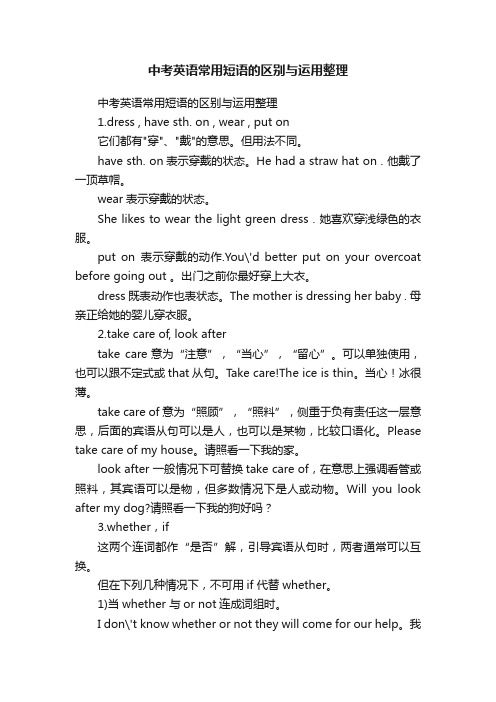
中考英语常用短语的区别与运用整理中考英语常用短语的区别与运用整理1.dress , have sth. on , wear , put on它们都有"穿"、"戴"的意思。
但用法不同。
have sth. on表示穿戴的状态。
He had a straw hat on . 他戴了一顶草帽。
wear表示穿戴的状态。
She likes to wear the light green dress . 她喜欢穿浅绿色的衣服。
put on表示穿戴的动作.You\'d better put on your overcoat before going out 。
出门之前你最好穿上大衣。
dress既表动作也表状态。
The mother is dressing her baby . 母亲正给她的婴儿穿衣服。
2.take care of, look aftertake care意为“注意”,“当心”,“留心”。
可以单独使用,也可以跟不定式或that从句。
Take care!The ice is thin。
当心!冰很薄。
take care of意为“照顾”,“照料”,侧重于负有责任这一层意思,后面的宾语从句可以是人,也可以是某物,比较口语化。
Please take care of my house。
请照看一下我的家。
look after 一般情况下可替换take care of,在意思上强调看管或照料,其宾语可以是物,但多数情况下是人或动物。
Will you look after my dog?请照看一下我的狗好吗?3.whether,if这两个连词都作“是否”解,引导宾语从句时,两者通常可以互换。
但在下列几种情况下,不可用if 代替whether。
1)当whether 与or not连成词组时。
I don\'t know whether or not they will come for our help。
2020年中考英语:常见短语辨析(2)

2020年中考英语:常见短语辨析(2)中考备考的方法有哪些?下面由小编为你精心准备了“2020年中考英语:常见短语辨析(2)”,持续关注本站将可以持续获取更多的考试资讯!2020年中考英语:常见短语辨析(2)31.好朋友good friend(s)32.他们的狗 their dog33.看look at看着图片look at the picture看着某人look at sb (宾格)看着我/ 她look at me / her34.我的所有的新同学all (of) my new classmates35.开门open the door别开窗户Don’t open the window(s)36.关门close the door别合上盒子Don’t close the box37.站起来,起立stand up38.坐下sit down39.翻书(打开书)open the book40.关书包close the school bag41.擦窗户clean the window(s)别擦门/课桌Don’t clean the door/desk42 去公园 go to the park去上学go to school43. 迟到be late44. 上学/上课迟到 be late for school / class45.不要再迟到Don’t be late again46.在一班in Class One在一年级 in Grade One47.在我的班上in my class在课堂上in class48.在墙上on the wall在教室的墙上 on the wall of the classroom49.在教室里in the classroom50.在黑板上on the blackboard51.在课桌上on the desk52.在椅子后面behind the chair53.讲台teacher’s desk在讲台上on the teacher’s desk54 参观我的学校visit my school55.在第一中学学习study in No. 1 Middle School56.十张小课桌ten small desks57.在我学校里in my school58.一间美术室an art room59.在美术室in the art room60.非常高兴very happy。
- 1、下载文档前请自行甄别文档内容的完整性,平台不提供额外的编辑、内容补充、找答案等附加服务。
- 2、"仅部分预览"的文档,不可在线预览部分如存在完整性等问题,可反馈申请退款(可完整预览的文档不适用该条件!)。
- 3、如文档侵犯您的权益,请联系客服反馈,我们会尽快为您处理(人工客服工作时间:9:00-18:30)。
中考英语常用短语的区别与运用(2)
三者都有“看”的意思。
look是看的过程。
I looked , but saw nothing . 我看了,但什么也没看见。
see是看的结果。
see a film看电影;see a play看戏(话剧)。
watch是看移动的事物或定晴地看。
watch a football match看足球比赛。
watch TV看电视。
sometime是副词,可与过去时或将来时连用,表示”(在过去)某个时候”或”(在将来)某个时候”。
如:I saw him sometime in May。
some time多数情况下作名词短语,意为”一些时间;一些时候”;它还可以作副词词组,用来表示一个未肯定的时刻,此时它可与sometime互换。
如:I\’ll be away for some time。
sometimes是一个表示时间频率的副词,意为”有时候”。
如:Sometimes I help my mother with the housework。
some times是”几次、几倍”之意。
如:They have been there several times。
how long意为”多久、多长时间”,主要是对一段时间进行提问,答语通常是(for)three days/weeks/months等时间段,它可用于各种时态。
How long do you stay in Beijing every year? 每年你在北
京住多久?
how often意为”多久……次、是否经常”,用来提问在某一特定的时间进行某个动作的次数,答语通常是always,usually,often,sometimes,once/twice a day/month等。
How often do you get to school very early? 你多久早到校一次?
how far意为”多远”,对距离提问时用。
How far is that? 那有多远?
how soon意为”还要多久”,是对从某个基本时间到将来某动作结束或某动作发生这段时间提问,常用在一般将来时态的句子中,其答语通常是”in + 一段时间”。
-How soon can you finish the work? 还要多久你能完成这项工作?
-In half an hour. 半小时后。
两者都有“同意”、“赞成”的意思。
agree with 后面常接表示人或意见(看法)的名词作宾语。
agree with 还有“适合”、“符合”的含义。
如:The climate here doesn\’t agree with him。
他不适合这里的气候。
agree to 后面一般接表示提议、办法、计划之类的名词作宾语。
agree on就…达成一致的意见。
(1)cross 意为“横过,穿过”为动词,相当于walk(go,
run)across
Look both ways before you cross the road。
(2)across意为“横过,穿过”为介词,不作动词,不能作谓语,常放在动词之后,如:go across
He walked across the field。
(3)through 是介词,含有“从…中间穿越”之意,表示四周含有物体的穿越。
The ball went through the window。
(4)past既可作形容词也可作副词,做副词时有:“穿过,越过”之意。
Will you be going past my house on your way home?
(5)crossing意为“渡口,人行横道,(铁路与公路的)交叉点。
All the cars should stop before the zebra crossing。
